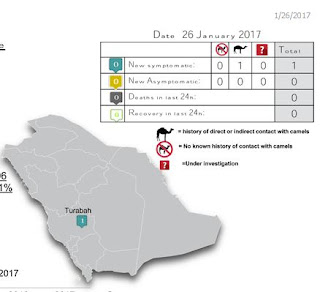#12,164
For the sixth day in a row the Saudi MOH has announced a single MERS case, this time in a 59 y.o. male with direct contact with camels. The patient is listed in critical condition and is the 21st case reported in 2017.
Overnight the WHO published an update on cases reported to them by KSA during the first week of January, among them were 5 cases from Buridah that were part of a limited nosocomial outbreak.
This update also includes a (very much welcomed) line listing of cases, something we've not seen in quite some time.
Between 2 and 7 January 2017 the National IHR Focal Point of Saudi Arabia reported nine (9) additional cases of Middle East Respiratory Syndrome (MERS) including two (2) fatal cases. Two (2) deaths among previously reported MERS cases (cases no. 7 and 8 in DON published on 17 January 2017) were also reported.
Detailed information concerning these cases can be found in a separate document (see link below). The five cases from Buridah reported are part of a small health care setting outbreak involving 2 hospitals. A Ministry of Health rapid response team has been dispatched and measures to prevent further cases including contact tracing, and strengthening of infection, prevention and control have been put in place. None of the cases reported are health care workers.
Globally, since September 2012, 1888 laboratory-confirmed cases of infection with MERS-CoV including at least 670 related deaths have been reported to WHO.
WHO risk assessment
MERS-CoV causes severe human infections resulting in high mortality and has demonstrated the ability to transmit between humans. So far, the observed human-to-human transmission has occurred mainly in health care settings.
The notification of additional cases does not change the overall risk assessment. WHO expects that additional cases of MERS-CoV infection will be reported from the Middle East, and that cases will continue to be exported to other countries by individuals who might acquire the infection after exposure to animals or animal products (for example, following contact with dromedaries) or human source (for example, in a health care setting). WHO continues to monitor the epidemiological situation and conducts risk assessment based on the latest available information.
WHO advice
Based on the current situation and available information, WHO encourages all Member States to continue their surveillance for acute respiratory infections and to carefully review any unusual patterns.
Infection prevention and control measures are critical to prevent the possible spread of MERS-CoV in health care facilities. It is not always possible to identify patients with MERS-CoV early because like other respiratory infections, the early symptoms of MERS-CoV are non-specific. Therefore, health-care workers should always apply standard precautions consistently with all patients, regardless of their diagnosis. Droplet precautions should be added to the standard precautions when providing care to patients with symptoms of acute respiratory infection; contact precautions and eye protection should be added when caring for probable or confirmed cases of MERS-CoV infection; airborne precautions should be applied when performing aerosol generating procedures.
Until more is understood about MERS-CoV, people with diabetes, renal failure, chronic lung disease, and immunocompromised persons are considered to be at high risk of severe disease from MERS-CoV infection. Therefore, these people should avoid close contact with animals, particularly camels, when visiting farms, markets, or barn areas where the virus is known to be potentially circulating. General hygiene measures, such as regular hand washing before and after touching animals and avoiding contact with sick animals, should be adhered to.
Food hygiene practices should be observed. People should avoid drinking raw camel milk or camel urine, or eating meat that has not been properly cooked.
WHO does not advise special screening at points of entry with regard to this event nor does it currently recommend the application of any travel or trade restrictions.
